
 |
||||||
|
GAY
FILM REVIEWS BY MICHAEL D. KLEMM
|
||||||
|
Frisk Strand
Releasing, Director: Screenplay: Starring:
Unrated, 88 minutes |
Dangerous
Liaisons
It has been over a decade since I first encountered Frisk (1996), Todd Verow's controversial first feature film. I was well aware, at the time, of the debate that waged within the gay community over this movie. I didn't quite know what to make of Frisk; I found the film to be electric and well crafted but the story rather... pointless. Still, I was unable to get the film out of my mind. I even went out and bought the book that it was based on, expecting new insights but still not getting it. This was one of those film experiences where you find yourself continually asking the question - pardon my French - what the fuck am I watching? Over the last year, I have written about four of Verow's later films, Bulldog In The Whitehouse, Between Something & Nothing, Vacationland and Anonymous, and I decided it was time to take a second look at his "notorious" Frisk. |
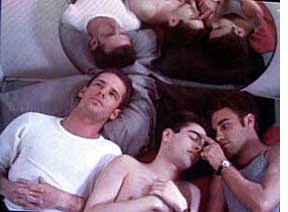 Frisk
premiered at the 1996 San Francisco Lesbian and Gay Film Festival. Its
reception was on par with the first performance of Igor Stravinsky's The Rite
Of Spring in 1913, and the first screening of Louis Bunuel and Salvador
Dali's shocking Surrealist short, Un Chien Andalou in 1929. Frisk polarized the audience and nearly caused a riot. There was a very vocal
faction within the gay community that insisted that all of our films depict
only positive portrayals of gay people. Half of the audience loudly walked
out of the screening and many of them returned at the end to boo the movie
and the filmmaker. Frisk
premiered at the 1996 San Francisco Lesbian and Gay Film Festival. Its
reception was on par with the first performance of Igor Stravinsky's The Rite
Of Spring in 1913, and the first screening of Louis Bunuel and Salvador
Dali's shocking Surrealist short, Un Chien Andalou in 1929. Frisk polarized the audience and nearly caused a riot. There was a very vocal
faction within the gay community that insisted that all of our films depict
only positive portrayals of gay people. Half of the audience loudly walked
out of the screening and many of them returned at the end to boo the movie
and the filmmaker. |
|
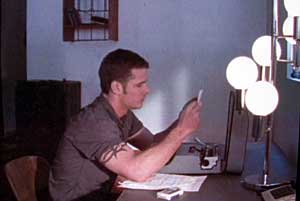 And
what was all the fuss about? Based on the equally controversial 1991 novel
by Dennis Cooper, Frisk is the
story of a young gay man who is obsessed with sado-masochistic sex and whose
urges may, or may not, have led him to become a serial killer. The non-linear
film is narrated by Dennis (Michael Gunther) in the form of a letter that was written
to his old best friend/fuck buddy Julian (Jaie Laplante), and his younger
brother, Kevin (Raoul O'Connell). Dennis and Julian used to get high and
indulge in 3-way sex. Sometimes, Dennis liked to get a little rough
with their tricks. When Julian left for Paris with an older man, Dennis
fell for Kevin. But that "seemed too big of a responsibility at the time"
and he left town. As Frisk opens,
the two brothers are on their way to see Dennis for the first time in years.
They are debating whether the letter he sent is to be trusted, or if their
old friend is just making its violent and murderous contents up. And
what was all the fuss about? Based on the equally controversial 1991 novel
by Dennis Cooper, Frisk is the
story of a young gay man who is obsessed with sado-masochistic sex and whose
urges may, or may not, have led him to become a serial killer. The non-linear
film is narrated by Dennis (Michael Gunther) in the form of a letter that was written
to his old best friend/fuck buddy Julian (Jaie Laplante), and his younger
brother, Kevin (Raoul O'Connell). Dennis and Julian used to get high and
indulge in 3-way sex. Sometimes, Dennis liked to get a little rough
with their tricks. When Julian left for Paris with an older man, Dennis
fell for Kevin. But that "seemed too big of a responsibility at the time"
and he left town. As Frisk opens,
the two brothers are on their way to see Dennis for the first time in years.
They are debating whether the letter he sent is to be trusted, or if their
old friend is just making its violent and murderous contents up. |
|
|
Dennis graduates
from vanilla to violent S&M and, before long, he begins to kill the tricks
whom he brings home. He then hooks up with a deranged couple played by
James Lyons and indie goddess Parker
Posey, and the three of them abuse, kill and eviscerate a series of
unfortunate men. |
|
|
Frisk
is a walk down the dark side like you've never seen before. It is a thoroughly
unpleasant story that, nevertheless, grabs you by the throat and never
lets go. But it is a very schizophrenic film that is ultimately an exercise
in style over substance. Frisk
is beautifully crafted on a visual and visceral level but, at the end,
you have to ask yourself: what was the point of this tale? |
|
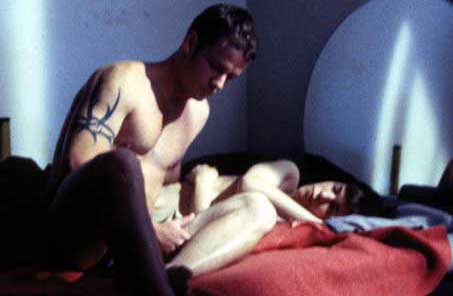 |
|
| It's not a horror film. It's not a crime drama. It's not even a psychological study. Dennis is such a blank slate that we know absolutely nothing about him; a fault that can be traced back to its source material. (In all fairness, Frisk is not a book that lends itself easily to cinematic adaptation.) Aside from an early exposure to violent porn, there is no character development to supply the audience with any clues. There is no childhood trauma or abuse. His family and backstory isn't mentioned - and even Sweeney Todd was given a reason for why he cuts the throats of his barbershop customers. Mental illness is never suggested. Perhaps this is the point; that our hold on reality is so tenuous, and the tendency for savagery so rooted in on our DNA, that anyone can snap at any given moment. But, ultimately, does it even matter if Dennis is really a killer or if he is just making this story up? Is the answer to this question enough to hang a full length novel and film upon? | |
 Although
Frisk asks more questions than
it answers, ambiguity is not always an end that justifies the means. As
a rule, people do not become serial killers, or harbor such thoughts, just
because they looked at alleged snuff pictures in their youth. To suggest
this would mean giving credence to conservatives who insist that pornography
is inherently dangerous. To hypothesize further would mean divulging the
ending (wherein the key to unlocking Frisk
probably lies - make sure you watch the film until the end of the credits)
and I'd like viewers to decide for themselves what this film is really about. Although
Frisk asks more questions than
it answers, ambiguity is not always an end that justifies the means. As
a rule, people do not become serial killers, or harbor such thoughts, just
because they looked at alleged snuff pictures in their youth. To suggest
this would mean giving credence to conservatives who insist that pornography
is inherently dangerous. To hypothesize further would mean divulging the
ending (wherein the key to unlocking Frisk
probably lies - make sure you watch the film until the end of the credits)
and I'd like viewers to decide for themselves what this film is really about. |
|
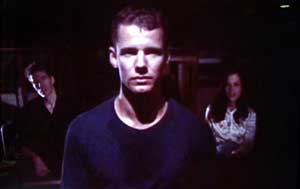 Charges
of homophobia were leveled towards the film. Activists who were tired of
Hollywood's history of psycho gay killers didn't want to see members of
our own community committing the same transgressions. Why would a gay
filmmaker want to make a new Cruising
for the 1990s? This is an interesting question and not without merit. But
it is unfair to lump Frisk in
the same category as the ones that fired our rage in the past. (Fight
Club [1999] and American Psycho [2000] can probably be considered
as Frisk's stepchildren.) In
Frisk's defense, it is nowhere
suggested that homosexuality has anything to with our protagonist's motives.
And besides, it's also worth pointing out that the 90s began spendidly with
queer films taking huge risks (The
Living End, Poison, Zero
Patience, to name a few) and, by mid-decade, many movies were becoming
more mainstream and playing it safe. Frisk
certainly shook up the status quo. Charges
of homophobia were leveled towards the film. Activists who were tired of
Hollywood's history of psycho gay killers didn't want to see members of
our own community committing the same transgressions. Why would a gay
filmmaker want to make a new Cruising
for the 1990s? This is an interesting question and not without merit. But
it is unfair to lump Frisk in
the same category as the ones that fired our rage in the past. (Fight
Club [1999] and American Psycho [2000] can probably be considered
as Frisk's stepchildren.) In
Frisk's defense, it is nowhere
suggested that homosexuality has anything to with our protagonist's motives.
And besides, it's also worth pointing out that the 90s began spendidly with
queer films taking huge risks (The
Living End, Poison, Zero
Patience, to name a few) and, by mid-decade, many movies were becoming
more mainstream and playing it safe. Frisk
certainly shook up the status quo. |
|
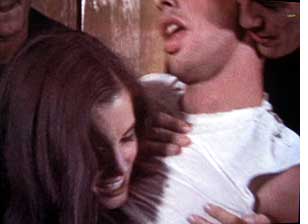 Frisk
was also attacked for its violence but the brutality and gore is actually
kept to a minimum. The intensity level of this film leads filmgoers to believe
that they are seeing more than they actually do. Verow's camera is often
hand-held, in close and right at the center of the action and thus hides
as much as it shows. There are many close-ups of eyes and wide open mouths.
The music is loud and punkish, reds and oranges dominate the color scheme.
Most of the more graphic violence is described in voice-overs. The editing
is frantic and fragments the action, much like Hitchcock's classic shower
murder in Psycho (1960). Flesh (and penises) are abundant and this
helps to drive home the obvious sexual thrill of the violent goings-on.
Most of the victims are attractive (Dennis is a hot number himself) and
the audience is often titillated but then punished for enjoying the ample
beefcake. Frisk
was also attacked for its violence but the brutality and gore is actually
kept to a minimum. The intensity level of this film leads filmgoers to believe
that they are seeing more than they actually do. Verow's camera is often
hand-held, in close and right at the center of the action and thus hides
as much as it shows. There are many close-ups of eyes and wide open mouths.
The music is loud and punkish, reds and oranges dominate the color scheme.
Most of the more graphic violence is described in voice-overs. The editing
is frantic and fragments the action, much like Hitchcock's classic shower
murder in Psycho (1960). Flesh (and penises) are abundant and this
helps to drive home the obvious sexual thrill of the violent goings-on.
Most of the victims are attractive (Dennis is a hot number himself) and
the audience is often titillated but then punished for enjoying the ample
beefcake. |
|
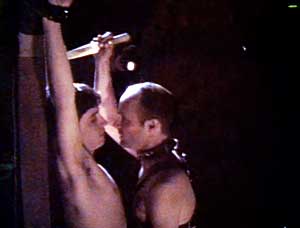 However,
despite my doubts over its impenetrable plot, the film still inflames my
desire to explore its mysteries. Certain scenes are seared into my brain
forever; the creepiest appears at the film's midpoint when Henry, the model
for the faked snuff photos, is stoned out of his gourd and goes to the home
of a sadist and allows himself to be bound in his basement. His captor begins
to tease him with a knife and tells them that he has always fantasized killing
one of his tricks but something has always held him back from actually doing
it... but not this time. The camera stays on a tight close-up of actor Craig
Chester's face and his stoned expression, as he realizes that he is about
to die, induces chills. In fact, his story would have made a compelling
film in its own right. However,
despite my doubts over its impenetrable plot, the film still inflames my
desire to explore its mysteries. Certain scenes are seared into my brain
forever; the creepiest appears at the film's midpoint when Henry, the model
for the faked snuff photos, is stoned out of his gourd and goes to the home
of a sadist and allows himself to be bound in his basement. His captor begins
to tease him with a knife and tells them that he has always fantasized killing
one of his tricks but something has always held him back from actually doing
it... but not this time. The camera stays on a tight close-up of actor Craig
Chester's face and his stoned expression, as he realizes that he is about
to die, induces chills. In fact, his story would have made a compelling
film in its own right. |
|
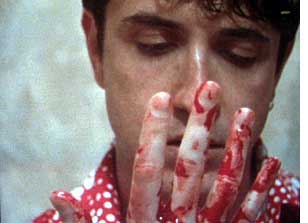 Two
performances are stand-outs. Chester's nuanced portrayal of the self-conscious
slave ("if you could change one thing about me, what would it be?") is,
at times, hilarious with just a hint of pathos. Parker Posey's genius for
improvisation (Waiting
For Guffman, A Mighty Wind) is legendary. Her quirky portrayal
mesmerizes while, at the same time, also supplying some great Pulp Fiction-style moments.
Verow's unconventional casting also includes Michael Stock from a very dark
1993 German queer film about addiction, street punks and the S&M underground
called Prince In Hell. Alexis
Arquette also appears as one of the victims. Michael Gunther, as Dennis,
is a hunky Tom of Finland mannequin with a tribal tattoo around his large
bicep; a tabla rosa open to numerous audience interpretations. The director
and the book's author, Dennis Cooper, have brief cameos. Two
performances are stand-outs. Chester's nuanced portrayal of the self-conscious
slave ("if you could change one thing about me, what would it be?") is,
at times, hilarious with just a hint of pathos. Parker Posey's genius for
improvisation (Waiting
For Guffman, A Mighty Wind) is legendary. Her quirky portrayal
mesmerizes while, at the same time, also supplying some great Pulp Fiction-style moments.
Verow's unconventional casting also includes Michael Stock from a very dark
1993 German queer film about addiction, street punks and the S&M underground
called Prince In Hell. Alexis
Arquette also appears as one of the victims. Michael Gunther, as Dennis,
is a hunky Tom of Finland mannequin with a tribal tattoo around his large
bicep; a tabla rosa open to numerous audience interpretations. The director
and the book's author, Dennis Cooper, have brief cameos. |
|
|
More On Todd Verow: Berlin
Film Festival Essay: More on Craig
Chester: Parker Posey also
appears in: Alexis Arquette
also appears in:
|